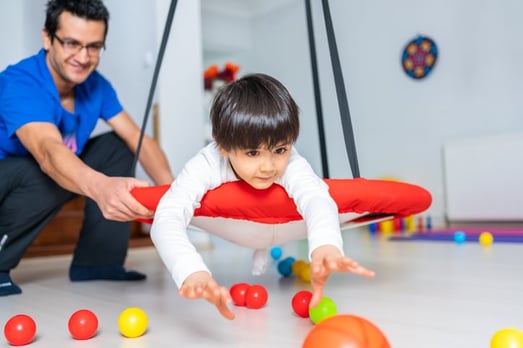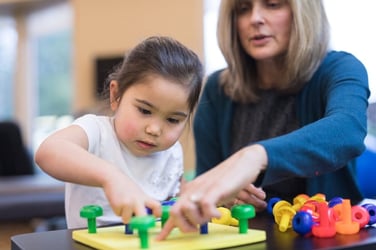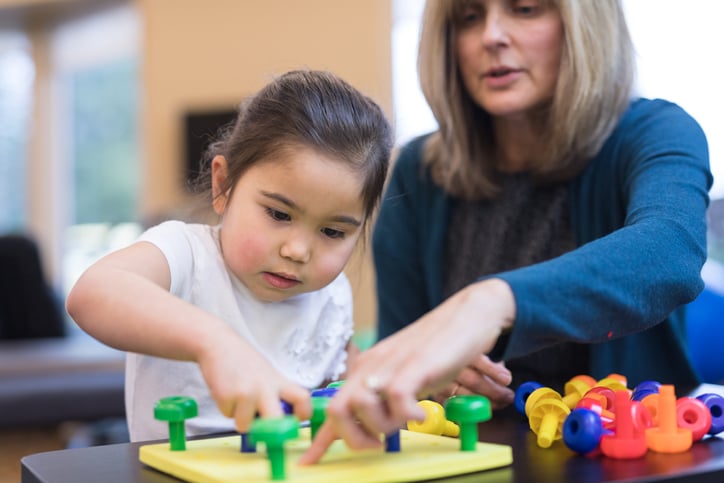Does My Autistic Child Need Occupational Therapy?
Assessing Fine and Gross Motor Skills Can Provide the Answer
Motor skills are essential for children to explore, interact, and learn from their environment in order to develop cognitive and language skills. Because motor skills develop early in young children, deficits in these skills can provide early warning signs of other possible deficits or disorders.
Motor skills refer to the movement and coordination of the muscles and body. Fine motor skills are smaller movements such as using fingers to grasp a spoon. Gross motor skills are large coordinated movements of a child’s legs, arms, or other large body parts needed for running, jumping, or throwing. Children begin to develop fine and gross motor skills as babies and this development typically takes place on a predictable timeline. This timeline makes assessment of these skills possible in order to identify children who may be at risk for developmental delays due to weaknesses in motor skills.

The Link Between Motor Skill Delays and Autism
It is estimated that 80% of autistic children have motor skill challenges. Motor skill delays are often one of the first developmental concerns reported by parents of children later diagnosed as autistic. The most common types of challenges are gross motor deficits such as coordinating arms and legs during balance, speed, or agility tasks. Ataxic gait -- characterized by difficulty walking in a straight line, poor balance, and lateral veering -- is also more commonly found in autistic children.
Using a developmental milestone chart can be useful in assessing possible delays in motor development. It is essential to note that there is variation in the development of these skills and a child is not considered delayed unless they have passed the recommended age for that milestone.
There are dozens of assessments for motor skills that target specific age groups, that are research-validated, and that are designed to be used by a professional observing performance or by a parent or caregiver filling out a survey.1 The CDC has a useful chart, video, and app that provide milestones for parents to use to track and determine when it might be necessary to consult with an expert. If you have a concern the first step is to meet with your child’s pediatrician and get a referral, if needed, to an occupational therapist or other specialist.
Age in months |
Milestone |
|
2 |
Holds head up, pushes up when lying on stomach |
|
4 |
Holds head steady (neck control), starts to roll over, brings hands to mouth |
|
6 |
Rolls over in both directions; starts to sit unsupported |
|
9 |
Stands with support, sits unsupported, crawls |
|
12 |
Walks supported; stands independently |
|
18 |
Walks independently, drinks from a cup, eats with a spoon |
|
24 |
Runs; climbs on furniture unassisted |
|
36 |
Climbs independently, runs smoothly, walks up and down steps |
|
48 |
Hops, catches bounced ball, cuts with scissors (supervised) |
|
60 |
Uses utensils, swings, stands on one foot for at least 10 seconds |
The above information and chart were adapted from: Matheis M., Estabillo J.A. (2018) Assessment of Fine and Gross Motor Skills in Children. In: Matson J. (eds) Handbook of Childhood Psychopathology and Developmental Disabilities Assessment. Autism and Child Psychopathology Series. Springer.
If your child does have a delay in motor development, don’t despair. There are many resources and specialists you can tap into to boost your child’s motor skills and holistic development. A great example of someone you can consult is an occupational therapist.

What Do Occupational Therapists Do?
Occupational therapists treat children who have delays in motor skills and related behaviors by designing and working on a series of activities with them so that they can lead independent lives. They also help the elderly and people with permanent disabilities, such as cerebral palsy.
At first glance, you might question how an occupational therapist can benefit children with autism and motor skill delays. This is a common question raised by parents. Occupational therapists work with parents and teachers in school, home, and outdoor settings to help children develop self-help skills to assimilate successfully into society and improve their skills.
You might wonder, “Is there a chance my child might outgrow his motor skills delay? What if all he needs is time?” But it’s important not to wait too long before pursuing help. The earlier you recognize and work with your child on his motor skills, the lower the probability that your child’s challenges become a limitation later in life. An OT can help provide personally designed plans to help your child develop skills.
Children with gross motor difficulties may have issues with daily activities, such as feeding themselves or dressing independently. With occupational therapy, you are giving them a chance to exhibit age-appropriate self-help skills that could enhance their self-esteem, emotional regulation skills, and attention span. During therapy, children will receive opportunities to strengthen their balancing and body awareness skills. These skills help them maintain their posture in the playground and classroom, preventing accidents. A firm foundation in gross motor skills also enables children to engage in cooperative play with their peers, which improves their sportsmanship and interactions with other children.
In terms of fine motor skills, children with autism often have poor eye-hand coordination–a skill that affects their handwriting and ability to manipulate small, everyday objects. Through therapy, they can participate in activities to practice their pincer grasp, the foundation for a good pencil grip. The therapist will also scaffold children’s learning to ensure children do not feel overwhelmed and this can help them to persist in the face of frustration.
 Autistic children with motor skills delay may struggle with visual-motor integration. A deficit in this area causes children to have difficulty imitating and learning good social practices from peers. They may also have issues empathizing with others. By visiting an occupational therapist, children will learn to not only improve their motor skills but will also learn to interact and understand others’ non-verbal cues through activities such as role-play. These activities will teach them to differentiate people’s emotions based on their facial expressions, body language, and tone. Children also learn to apply simple techniques to regulate their emotions, an aspect of emotional competence.
Autistic children with motor skills delay may struggle with visual-motor integration. A deficit in this area causes children to have difficulty imitating and learning good social practices from peers. They may also have issues empathizing with others. By visiting an occupational therapist, children will learn to not only improve their motor skills but will also learn to interact and understand others’ non-verbal cues through activities such as role-play. These activities will teach them to differentiate people’s emotions based on their facial expressions, body language, and tone. Children also learn to apply simple techniques to regulate their emotions, an aspect of emotional competence.
One in six autistic children has sensory processing difficulties. A sensory overload can cause them to enter a meltdown, hindering their chances of forming and maintaining reciprocal relationships. Sensory issues are one of the many challenges that occupational therapists can help address. Occupational therapists can reduce children’s sensory processing disorders through a series of well-planned exercises. They will apply sensory integration therapy to help children’s nervous system process and tolerate distracting sensations and situations. With therapy, their attention span and tolerance increase. They will gradually learn to be less easily distracted by stimuli such as sounds and smells, resulting in greater academic and social success.
An occupational therapist does more than improve your children’s motor and social-emotional skills. They can enhance your children’s quality of life and help them form lasting relationships. Don’t wait any longer; if you suspect your child has delays in motor skills seek help from an occupational therapist and help your children achieve their fullest potential.
If you have used an OT for your autistic child please share your experiences. Did you find it helpful? What in particular was helpful about it?
We hope you enjoyed the information in this article. STAGES® Learning also offers free downloadable resources to support teaching and learning with autistic individuals. Start with our free Picture Noun Cards and see our collection of other downloadable resources here!
References:
1. Matheis M., Estabillo J.A. (2018) Assessment of Fine and Gross Motor Skills in Children. In: Matson J. (eds) Handbook of Childhood Psychopathology and Developmental Disabilities Assessment. Autism and Child Psychopathology Series. Springer.

Isabelle Eng
Isabelle Eng is a lecturer at the National Institute of Early Childhood Development, an institution in Singapore that provides training to pre- and in-service teachers. She is passionate about teachers' professional development and aims to equip teachers with practical knowledge, resilience, and grit. Isabelle believes teachers' technical knowledge and character traits play a crucial role in impacting students' quality of education. Isabelle holds a Master's Degree of Education from the Harvard Graduate School of Education, where she specialized in Language and Literacy.




